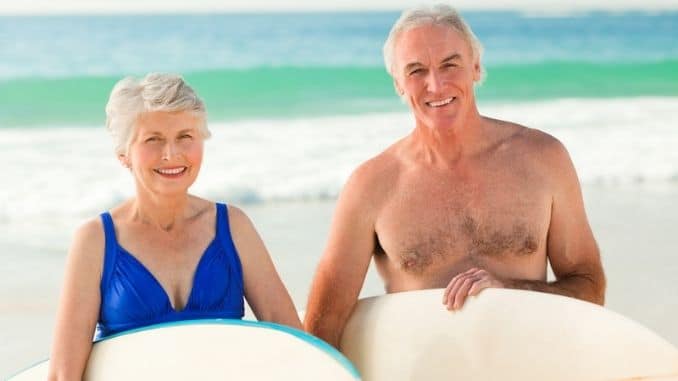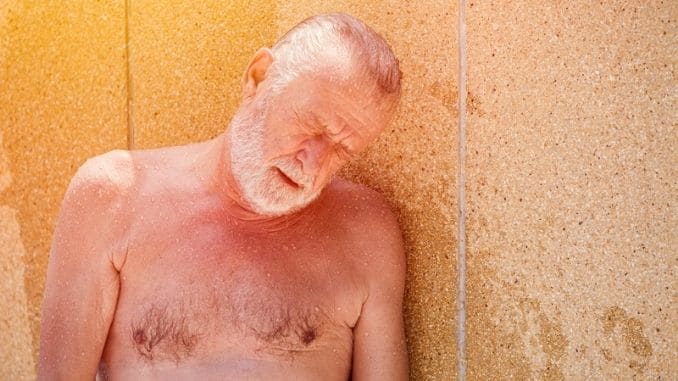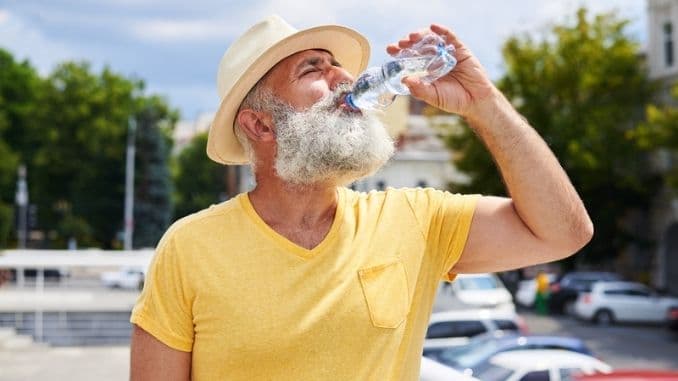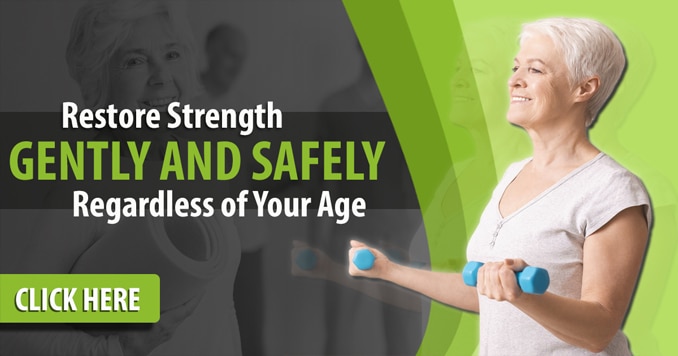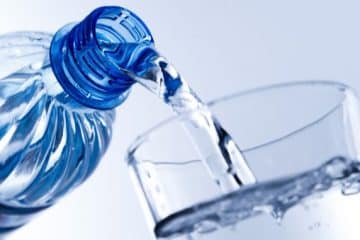With the summer weather upon us, Mother Nature is dialing up the heat. According to Climate Central, in the past half-century, summer temperatures have risen 2.0 degrees Fahrenheit on average in the U.S., with the eight largest increases occurring in cities in Texas, Idaho, and Nevada.
With the more intense heat comes a higher risk of heat-related illnesses. Between 2004 and 2018, an average of 702 heat-related deaths occurred in the U.S., with those over the age of 65 years being most vulnerable.
Heatwaves claim more lives each year than all other weather-related exposures combined, including hurricanes, tornadoes, floods, and earthquakes. They are also associated with increased hospitalizations for cardiovascular, kidney, and respiratory disorders.
Fortunately, heat-related illnesses are preventable. The key is to be well informed about what can happen and how to prevent it.
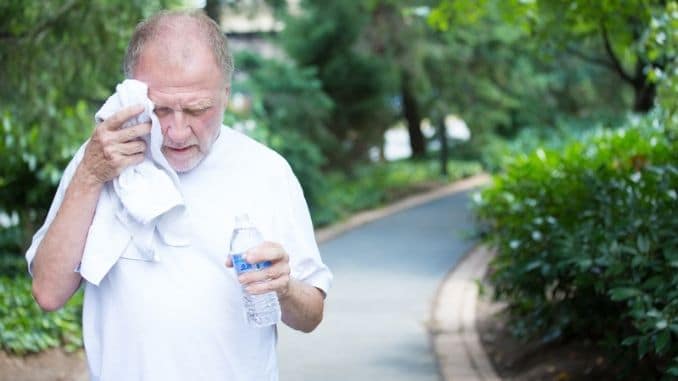 What Are Heat-Related Illnesses?
What Are Heat-Related Illnesses?
Heat-related illness, also called hyperthermia, results from exposure to extreme heat, where the body is no longer able to properly cool itself. In hot weather, you cool off mainly by sweating. The evaporation of the sweat helps the body maintain its normal temperature. If you exercise strenuously, though, or if you’re out in very hot and humid weather, the body will struggle to stay cool.
This results in a rapid rise in body temperature, which can lead to the following conditions.
Heat Cramps
The mildest of the three heat-related illnesses, heat cramps are painful, involuntary cramps that occur in the muscles, usually in the arms, legs, or abdomen. The muscles contract and spasm, often because of dehydration and electrolyte loss that can occur when exercising in hot temperatures.
Those who are not used to exercising in the heat, aren’t in shape yet, or sweat a lot are most at risk for heat cramps. Consuming a diet too low in sodium or other electrolytes can also increase risk, as can wearing a lot of clothing or protective equipment.
To treat heat cramps:
- Rest and cool down
- Drink clear juice or an electrolyte-containing sports drink
- Gently stretch and massage the painful muscles
- Wait for several hours or longer to exercise again
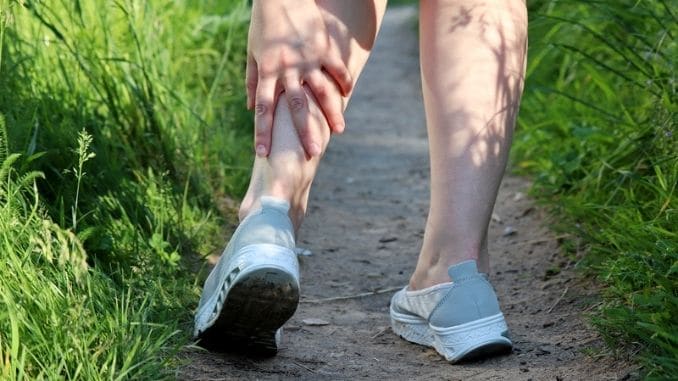 Heat Exhaustion
Heat Exhaustion
Heat exhaustion occurs when the body overheats and can’t cool itself down. It often results from physical activity in hot and humid weather. Symptoms may include:
- Dizziness
- Confusion
- Nausea
- Fatigue
- Weak, rapid pulse
- Muscle cramps
- Headache
Without immediate treatment, heat exhaustion can progress to heat stroke, so it's critical to address it right away.
- Stop all activity and rest
- Move to a cooler place
- Drink cool water or electrolyte-containing sports drinks
If your symptoms don’t improve within an hour, contact your doctor.
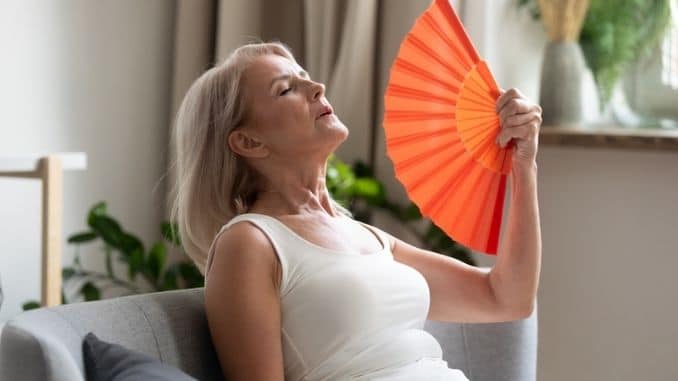 Heat Stroke
Heat Stroke
The most serious of all heat-related illnesses, heatstroke occurs when the body reaches a core temperature of 103 degrees Fahrenheit or higher. This is a life-threatening condition and requires immediate treatment.
Other symptoms may include:
- Red, hot, and dry skin (no sweating)
- Rapid, strong pulse
- Rapid breathing
- Throbbing headache
- Dizziness
- Nausea
- Confusion
- Unconsciousness
To treat heat stroke, call for medical help right away. Then:
- Rest in a cool place.
- Drink cool fluids or sports drinks.
- Try to cool down with a cool shower or bath, or apply cool, soaked towels to the skin. The faster you can do this, the better.
- Remove any unnecessary clothing and loosen anything tight.
Who is Most at Risk for Heat-Related Illnesses?
Some people are more at risk for heatstroke and other heat-related illnesses than others. Though anyone may suffer in extreme heat, the following risk factors can make you more sensitive:
- Older Age: Once you pass the age of 65, your body is not as efficient at cooling you down. You produce less sweat because your body retains less water, which means less cooling through evaporation.
- Young Age: Infants and children younger than four haven’t fully developed their cooling abilities yet.
- Medications: Some medications can affect the body’s ability to stay hydrated. These include some drugs used to treat high blood pressure, heart problems, allergy symptoms, anxiety, and delusions. Illegal drugs as well, including cocaine and amphetamines, can increase the body’s core temperature.
- Obesity: Excess weight affects the body’s ability to regulate its temperature, causing it to retain more heat.
- Medical Conditions: Chronic medical conditions, such as heart disease, can affect the body’s ability to cool down.
- Adaptability: If you're not used to high temperatures, you'll have a higher risk of suffering problems.
- High Heat Index: The heat index is a measurement of the outdoor temperature and humidity together. When both of these are high (91 degrees Fahrenheit or higher), the risk of heat exhaustion and heat stroke is greater.
Seniors can be particularly at risk, as they may have several of the above risk factors. A senior with heart disease, for example, will not be able to cool down as well, maybe on medications that make cooling more difficult, and may not feel thirsty, which can prevent them from hydrating as they should.
How to Protect Yourself from Heat-Related Illnesses
When temperatures start to climb, keep the following tips in mind.
1. Stay Out of the Heat
This is the best advice you can follow, particularly if you are vulnerable to heat-related illnesses. Try to avoid going out at the hottest times of the day, which typically occurs between the hours of 10:00 a.m. and 6:00 p.m.
2. Wear Appropriate Clothing
Choose lightweight, light-colored, loose-fitting clothing if you’re going to be out in the heat. Most people find natural fibers like cotton and linen to be cooler than synthetic fibers like nylon and polyester. Avoid dark-colored clothes as they absorb heat and will make you feel hotter. Don’t forget to add hats and sunglasses, and take an umbrella with you.
3. Stay Hydrated
Dehydration is at the root of most heat-related illnesses, particularly for seniors. Some seniors may not be aware that they're dehydrated and will need reminders from loved ones to drink often.
Be sure you take water and/or a sports drink with you and sip regularly even if you don’t feel thirsty. Meanwhile, avoid drinks with alcohol or caffeine as they can make dehydration worse.
4. Check the Heat Index
Look for a weather report that shows you the heat index for the day. It may also be listed as a “feels like” number. It will combine the heat and humidity to show you how hot it really is outside. Avoid going out if this number is over 90.
5. Cool Your Home Or Go Somewhere Else
If you have air conditioning, you should be perfectly safe inside your home. If you don’t, however, take care to monitor the heat. Keep shades, blinds, and curtains closed during the hottest part of the day, and open windows at night to let the cooler air in. Use fans positioned about the house to keep the air moving.
You may also want to consider purchasing an evaporative cooler. These use water to cool the air down and can be moved from room to room. You can also use cool baths and showers at midday to cool off, or simply place your feet in a pan of cool water.
Finally, if your house is hot, try spending some time during the hottest part of the day in another place that has air conditioning. Perhaps you can go to a friend's house, out to eat, to the mall or the movies, or drop by the library or senior center.
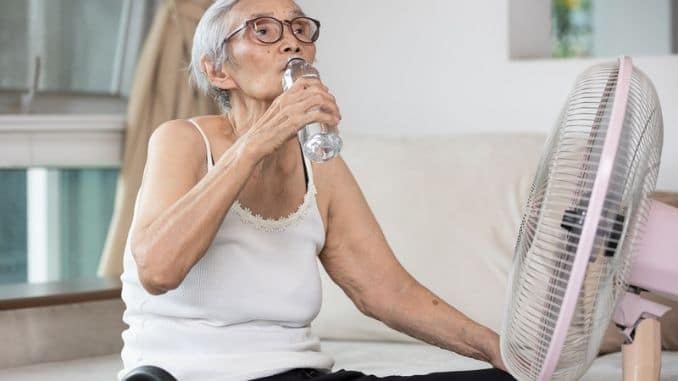 6. Take It Easy
6. Take It Easy
Don’t try to exercise or do hard work outdoors when it’s hot. Schedule your activities for early in the morning or later in the evening. In other words, ultra-hot weather is not the time to garden or take the dog for a walk. (It’s likely too hot for the dog too!) Wait for a few days for the weather to cool down, or go at times of the day (or night) when the heat is less intense.
7. Eat Hydrating Foods
If you’re having a picnic or barbeque outdoors when it’s hot, choose hydrating options like melons, citrus fruits, berries, pineapple, cucumbers, lettuce, celery, and zucchini to help you stay cool.
This is also a good idea even if you’re eating indoors. Stay away from the oven or stove, as they will make your home hotter. Stick to light salads, fruits, cold chicken, and raw vegetables. Try desserts like homemade popsicles or frozen grapes.
8. Protect Your Skin
If you get a sunburn, that can lessen your body's ability to cool down and can also lead to dehydration. Protect your skin from sunburn by wearing hats and sunglasses and staying in the shade. Then apply sunscreen with an SPF of 30 or higher to all areas of exposed skin, and re-apply every two hours. Look for sunscreens with zinc oxide or titanium dioxide—these are the safest to use.
9. Practice Car Safety
A car can heat up fast in warm weather. Don't let anyone (including pets) stay in the car when it is parked without air-conditioning. This can quickly lead to heat-related illness and death.
10. Address Problems Quickly
If you notice any of the symptoms listed above—heat cramps, heat exhaustion, or heat stroke—don’t hesitate to take action. Feeling faint or dizzy is an early sign of heat-related illness, as is feeling overly tired, having a rapid pulse, or suffering from muscle cramps.
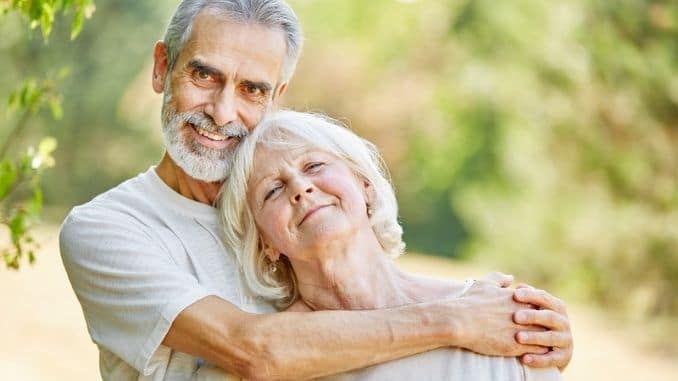
Addressing these issues immediately will help prevent more serious problems. The most important thing is to get out of the heat and cool down. Being proactive and planning for the hotter weather is the key to your safety.
Learn the best, all natural way to stay strong at any age. Click here to learn more.

